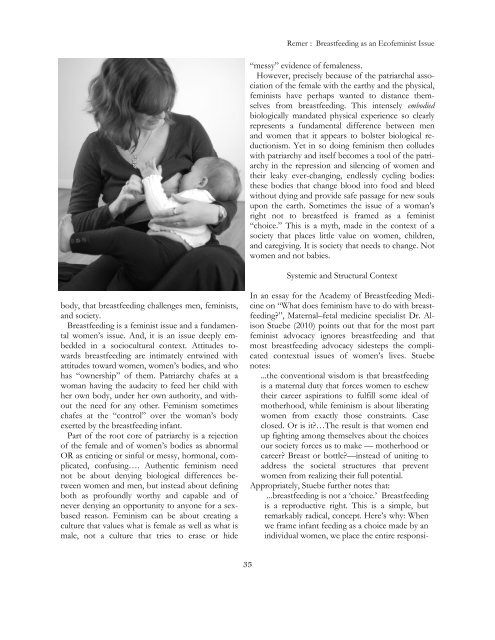Breastfeeding as an Ecofeminist Issue - Ocean Seminary College
Breastfeeding as an Ecofeminist Issue - Ocean Seminary College
Breastfeeding as an Ecofeminist Issue - Ocean Seminary College
You also want an ePaper? Increase the reach of your titles
YUMPU automatically turns print PDFs into web optimized ePapers that Google loves.
ody, that bre<strong>as</strong>tfeeding challenges men, feminists,<br />
<strong>an</strong>d society.<br />
<strong>Bre<strong>as</strong>tfeeding</strong> is a feminist issue <strong>an</strong>d a fundamental<br />
women’s issue. And, it is <strong>an</strong> issue deeply embedded<br />
in a sociocultural context. Attitudes towards<br />
bre<strong>as</strong>tfeeding are intimately entwined with<br />
attitudes toward women, women’s bodies, <strong>an</strong>d who<br />
h<strong>as</strong> “ownership” of them. Patriarchy chafes at a<br />
wom<strong>an</strong> having the audacity to feed her child with<br />
her own body, under her own authority, <strong>an</strong>d without<br />
the need for <strong>an</strong>y other. Feminism sometimes<br />
chafes at the “control” over the wom<strong>an</strong>’s body<br />
exerted by the bre<strong>as</strong>tfeeding inf<strong>an</strong>t.<br />
Part of the root core of patriarchy is a rejection<br />
of the female <strong>an</strong>d of women’s bodies <strong>as</strong> abnormal<br />
OR <strong>as</strong> enticing or sinful or messy, hormonal, complicated,<br />
confusing…. Authentic feminism need<br />
not be about denying biological differences between<br />
women <strong>an</strong>d men, but instead about defining<br />
both <strong>as</strong> profoundly worthy <strong>an</strong>d capable <strong>an</strong>d of<br />
never denying <strong>an</strong> opportunity to <strong>an</strong>yone for a sexb<strong>as</strong>ed<br />
re<strong>as</strong>on. Feminism c<strong>an</strong> be about creating a<br />
culture that values what is female <strong>as</strong> well <strong>as</strong> what is<br />
male, not a culture that tries to er<strong>as</strong>e or hide<br />
35<br />
Remer : <strong>Bre<strong>as</strong>tfeeding</strong> <strong>as</strong> <strong>an</strong> <strong>Ecofeminist</strong> <strong>Issue</strong><br />
“messy” evidence of femaleness.<br />
However, precisely because of the patriarchal <strong>as</strong>sociation<br />
of the female with the earthy <strong>an</strong>d the physical,<br />
feminists have perhaps w<strong>an</strong>ted to dist<strong>an</strong>ce themselves<br />
from bre<strong>as</strong>tfeeding. This intensely embodied<br />
biologically m<strong>an</strong>dated physical experience so clearly<br />
represents a fundamental difference between men<br />
<strong>an</strong>d women that it appears to bolster biological reductionism.<br />
Yet in so doing feminism then colludes<br />
with patriarchy <strong>an</strong>d itself becomes a tool of the patriarchy<br />
in the repression <strong>an</strong>d silencing of women <strong>an</strong>d<br />
their leaky ever-ch<strong>an</strong>ging, endlessly cycling bodies:<br />
these bodies that ch<strong>an</strong>ge blood into food <strong>an</strong>d bleed<br />
without dying <strong>an</strong>d provide safe p<strong>as</strong>sage for new souls<br />
upon the earth. Sometimes the issue of a wom<strong>an</strong>’s<br />
right not to bre<strong>as</strong>tfeed is framed <strong>as</strong> a feminist<br />
“choice.” This is a myth, made in the context of a<br />
society that places little value on women, children,<br />
<strong>an</strong>d caregiving. It is society that needs to ch<strong>an</strong>ge. Not<br />
women <strong>an</strong>d not babies.<br />
Systemic <strong>an</strong>d Structural Context<br />
In <strong>an</strong> essay for the Academy of <strong>Bre<strong>as</strong>tfeeding</strong> Medicine<br />
on “What does feminism have to do with bre<strong>as</strong>tfeeding?”,<br />
Maternal–fetal medicine specialist Dr. Alison<br />
Stuebe (2010) points out that for the most part<br />
feminist advocacy ignores bre<strong>as</strong>tfeeding <strong>an</strong>d that<br />
most bre<strong>as</strong>tfeeding advocacy sidesteps the complicated<br />
contextual issues of women’s lives. Stuebe<br />
notes:<br />
...the conventional wisdom is that bre<strong>as</strong>tfeeding<br />
is a maternal duty that forces women to eschew<br />
their career <strong>as</strong>pirations to fulfill some ideal of<br />
motherhood, while feminism is about liberating<br />
women from exactly those constraints. C<strong>as</strong>e<br />
closed. Or is it?…The result is that women end<br />
up fighting among themselves about the choices<br />
our society forces us to make — motherhood or<br />
career? Bre<strong>as</strong>t or bottle?—instead of uniting to<br />
address the societal structures that prevent<br />
women from realizing their full potential.<br />
Appropriately, Stuebe further notes that:<br />
...bre<strong>as</strong>tfeeding is not a ‘choice.’ <strong>Bre<strong>as</strong>tfeeding</strong><br />
is a reproductive right. This is a simple, but<br />
remarkably radical, concept. Here’s why: When<br />
we frame inf<strong>an</strong>t feeding <strong>as</strong> a choice made by <strong>an</strong><br />
individual women, we place the entire responsi-



